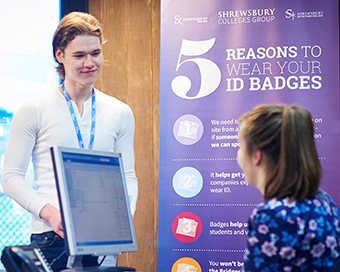It’s never too early to start thinking about what you want to do when you have finished your GCSEs.
There are many different opportunities that are open to you depending on your skills, interests, or the career path that you wish to pursue – the world really is your oyster.
When it comes to considering the next stage in your learning, look at the pros and cons of each of the options available to you. You might decide to study A Levels, a vocational course or one of the new T-Levels. Alternatively, you may wish to start an apprenticeship.
For some students, the decision is easy as they’ve always known what they’d like to do. However, for many students, the choices can seem overwhelming, and it might be unclear what the best option is for them.
There are factors for you to consider which may the choices easier to navigate and understand.
The first place to start is to consider what you enjoy and what you are good at. If you’ve enjoyed school and would like to continue your education in a similar setting, then choosing to do A Levels might be a good option for you. A Levels will give you a chance to find out about your favourite GCSE subjects in greater depth or try a new mix of subjects that weren’t available at school.
Studying A Levels would typically take two years and would usually lead to going to university.
SCG student Heather Randles agrees; “I chose Biology because it links up really well with my other chosen subjects and it will hold me in good stead for going to university to study paramedic sciences so that I can become a paramedic.”
If, however, you’ve enjoyed more practical subjects at school, then a vocational course or T Level might be more suited to you. Vocational courses can give you more hands-on experience and can be a quicker route into employment. There are usually lots of options with vocational courses with many taking one year to complete, but often continuing into higher-level courses in the same subject. T levels (Technical Levels) are new qualifications that offer students a mixture of classroom learning and ‘on-the-job’ experience during an industry placement. T Levels are ideal if you have completed your GCSEs and wish to continue your studies but also want to get into a skilled job. They are also great if you prefer a practical approach to your studies.
The next aspect of your decision is to consider what you’d like to do when you turn 18. Would you want to be still studying at that point? If so, higher education is a good option, and many students go on to study for degrees at universities or progress to more vocational-based courses like HNDs (Higher National Diplomas) or HNCs (Higher National Certificates).
For some careers, degrees or higher education qualifications are a requirement, but university can also help you develop other skills that will remain with you for life. Quite often attending university means leaving home for the first time and this can help you develop independence and self-reliance.
The third and final aspect of your decision is when you would like to start earning your own money. Attending college or university will limit your ability to earn money in the short term as studying will be your main focus and might not leave much time for a job. There is evidence that graduates generally have a higher earning potential compared to those who didn’t go to university.
However, if you would like to start earning money as soon as possible after leaving school, then an apprenticeship might be what you’re looking for. You can become an apprentice at 16 and therefore if you feel like you’re ready for a real job, then the apprenticeship route might be for you. Apprenticeships are becoming increasingly popular with young people as well as businesses. They give you the chance to earn while you learn. You’ll get paid while you are being trained for a specific career, plus you’ll also work toward an industry-specific qualification.
An Electrical Installation apprenticeship was right the right choice for Luke Grocott, who says; “It gets you ready for the work environment. It is totally different to school, which is what I wanted for my further education and the teachers treat you with respect. They let you know when you’re doing well and they’ll put you right if you’re going wrong.”
Apprenticeships are very popular with employers in many industries as they mean that businesses can train people with specific skills for their industry sector. There are a number of progression routes with apprenticeships as well as there are a number of higher and degree-level apprenticeships available.
There are several ways to start an apprenticeship and the quickest is to apply for an existing vacancy on the government’s Find an Apprenticeship website. If there aren’t any suitable vacancies on the government website, you can always try and find an employer who is willing to employ you and then apply for an apprenticeship via the college.
If you still can’t find an apprenticeship you can apply for a full-time course in your chosen subject and then when there’s a vacancy with an employer, the college can transfer you over to it.
More details on finding an apprenticeship can be found here.








